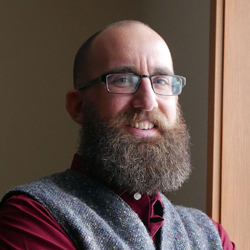This Ash Wednesday, mourning scours our hearts
The last two years have deepened our experience with grief. As we move into the season of Lent, a pastor and assistant professor asks what has been learned.
The last two years have deepened our experience with grief. As we move into the season of Lent, a pastor and assistant professor asks what has been learned.
 Link to author Timothy Adkins-Jones
Link to author Timothy Adkins-Jones
In their new book of devotions, Kate Bowler and Jessica Richie of the Everything Happens Initiative offer brief reflections, resonant prayers and actionable next steps for those who want off the path of relentless individual perfectionism.
Our notions of God are inevitably colored by our wounds and constrained by the limits of what we imagine to be possible. It’s so easy to mistake the flood of self-rejecting voices for God’s voice.
 Link to author Jean Neely
Link to author Jean Neely
Like many essential workers, pastors are pushed to work very hard for very little. It’s no surprise that so many of us are tired.
 Link to author Carrington Moore
Link to author Carrington Moore
A walk by a stream prompts a writer and spiritual director to wonder: Could a fresh understanding of joy help restore us?
 Link to author Samuel Rahberg
Link to author Samuel Rahberg
Despair is an understandable response to the world around us, writes an author and independent scholar living with bipolar disorder. But she finds hope in her trust that God is with her through it all.
 Link to author Jean Neely
Link to author Jean Neely
The toll of the last six months on clergy requires a sustained response, from the seminary and denominational levels as well as congregations, writes an expert on faith and mental health.
 Link to author Jessica Young Brown
Link to author Jessica Young Brown
Pastors can benefit from adaptable, restorative practices, writes a leading researcher on well-being in the workplace.
 Link to author Matt Bloom
Link to author Matt Bloom
Intentional self-care, a church’s ethos of care and congregational openness to new approaches are notable factors that contribute to the thriving of Black clergywomen, a researcher has found.
 Link to author Alexis Carter Thomas
Link to author Alexis Carter Thomas
A New York City pastor writes about the tradition of resilience in Black churches and how she finds joy in troubled times.
 Link to author Gabby Cudjoe-Wilkes
Link to author Gabby Cudjoe-Wilkes
